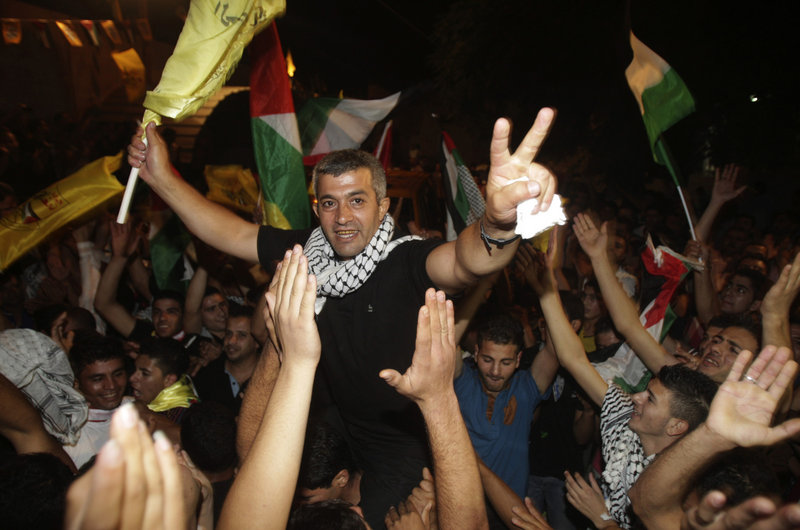AZMOUT, West Bank – Hosni and Mohammed Sawalha said they felt “a happiness that is almost indescribable,” but they looked shaky and exhausted, chain-smoking and downing coffee, as they stood for hours Wednesday to receive a line of well-wishers who embraced the cousins, kissed their cheeks, posed for photos with them and told them that they were heroes, home at last.
The Sawalha boys were just 16 and 17 when they left their village and boarded a bus in the Tel Aviv suburbs on Dec. 2, 1990. Witnesses recalled that they rode a few stops, sitting in the back, and then rose to shout “Allahu Akbar!” (“God is great!”) before stabbing to death Baruch Heisler, 24, an ultra-Orthodox Jew on his way to yeshiva to study.
Early Wednesday, the cousins were among the first of 26 Palestinian prisoners to be released by Israel as part of a deal brokered by Secretary of State John Kerry to bring Palestinian Authority President Mahmoud Abbas and his negotiating team back to the table. The State Department confirmed that the talks resumed in Jerusalem on Wednesday, but the proceedings were kept secret.
Israel says an additional 78 prisoners will be released over the next nine months, if negotiations progress.
The deal was a bitter pill for Israel to swallow, so bitter that ahead of the initial release, Prime Minister Benjamin Netanyahu offered a spoonful of sugar to the right-wing members of his shaky coalition government, announcing plans for up to 3,000 new housing units in the West Bank.
To many Jewish Israelis, and especially the relatives of the victims, the prisoners are murderers. To the Palestinians, they are soldiers who fought to end the occupation of their homeland.
“I don’t feel hatred,” Yosef Heisler, the father of Baruch, said in an interview. “I think they are base murderers who don’t need to be alive. They murdered in cold blood. But what difference does it make what I think or don’t think?”
The Heislers live in the ultra-Orthodox neighborhood of Ramat Shlomo in East Jerusalem. They said they were surprised to learn that the men who killed their eldest son were among those to be released. “No one asked us,” Yosef Heisler said.
“Peace is something every human being yearns for. The question of the price is another thing,” said Heisler, who is in his 70s. “If Baruch’s murderers were released as part of a peace agreement, it would have been a lot easier for me — that at least it was for something worthwhile to humanity, worthwhile to the people in the world. But for zero — just to talk — is something else.”
He said, “I have nothing to ask them.”
BROTHERS WERE MILITANTS
Abbas welcomed 11 of the 26 freed prisoners to the government compound in the West Bank city of Ramallah early Wednesday. He kept his speech short. “We welcome our brothers who have left the darkness of prison into the light of freedom and tell them they are the first, but that there are other brothers who, too, will leave soon,” he said. “We shall not rest until they are all with us.”
After the speeches and a visit to the tomb of Palestinian leader Yasser Arafat, the Sawalha cousins were driven back to their home. Azmout is a hillside village on the outskirts of Nablus, where the limestone dust coats the leaves of the olive trees like snow. In the center of town, beside an old mosque, yellow flags of Abbas’s Fatah party fluttered.
In 1990, before the Oslo Accords, before Arafat won a Nobel Peace Prize, alongside Israelis Shimon Peres and Yitzhak Rabin, Fatah sponsored armed militant groups. The flags show a pair of fists and two automatic rifles crossed.
The Sawalha cousins were Fatah activists when they staged their deadly attack in December 1990, according to Israeli prosecutors. The killing garnered just a few paragraphs in U.S. newspapers. In addition to killing Heisler, the cousins used their knives to slash three girls on the bus, who survived. Another Palestinian who joined the Sawalhas in the attack was fatally shot by Israeli police at the scene.
At the time, Israeli security officials blamed the attacks on heightened emotions and extremism stoked by Iraqi leader Saddam Hussein’s invasion of Kuwait and the threatened Western-led effort to oust his troops that became the first Iraq war. The cousins were convicted of murder and sentenced to life in prison.
Asked whether he had any regrets, any remorse, Mohammed Sawalha said he preferred not to answer directly. “What happened happened. . . . Let’s talk about the future.
Send questions/comments to the editors.



Success. Please wait for the page to reload. If the page does not reload within 5 seconds, please refresh the page.
Enter your email and password to access comments.
Hi, to comment on stories you must . This profile is in addition to your subscription and website login.
Already have a commenting profile? .
Invalid username/password.
Please check your email to confirm and complete your registration.
Only subscribers are eligible to post comments. Please subscribe or login first for digital access. Here’s why.
Use the form below to reset your password. When you've submitted your account email, we will send an email with a reset code.